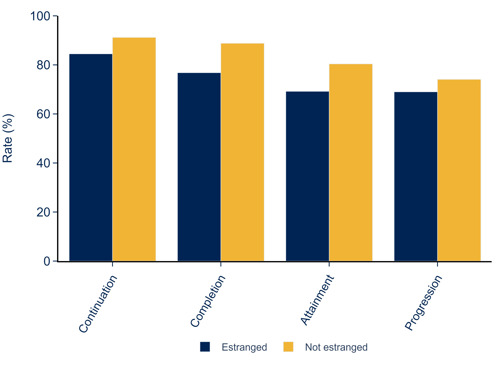Estranged students
This refers to young people studying without the support and approval of a family network.
Some studies define an estranged student as having no contact whatsoever with family, whereas others are less strict.
Key statistics
Continuation – Progression:
The Education and Skills Funding Agency’s (ESFA’s) individualised learner record (ILR), The Student Return, collected by the Designated Data Body (DDB) and The Student Alternative (SA) record, collected by the Designated Data Body (DDB).
On a provider level:
UCAS provides information on estranged student status. This is self-reported by the student. It can be matched to Individual Learner Records by a provider for internal database purposes.
On a national level:
The student characteristics data: Outcomes data dashboard has information on the profile, continuation, completion, attainment and progression rates of estranged students.
The National Student Survey data: student characteristics data has information on the experience of estranged students.
Note: Definitions and the quality of each study vary.
Bachmann, C.L. and Gooch, B. (2018) ‘LGBT in Britain: Health report. Stonewall Group’. (Accessed 12/01/2024)
Bland, B (2015) ‘Focus on access and retention. Risks for students who are estranged or disowned by their family’.
Bland, B. & Shaw, J. (2015) ‘New Starts: The challenges of Higher Education without the support of a family network’. Unite Foundation & Standalone
HEPI (2023) ‘Student Academic Experience Survey 2023’. HEPI. (Accessed 12/12/2023)
Standalone Pledge. ‘Who are estranged students?’ (Accessed 12/01/2024)
TASO (2023) ‘Rapid review to support development of the Equality of Opportunity Risk Register’. (Accessed 12/01/2024)
UCAS ‘Next Steps: What is the experience of LGBT+ Students in Education?’ (Accessed 12/12/2023)
Unite Foundation & Stand Alone (2015) ‘New Starts: The challenges of Higher Education without the support of a family network’. (Accessed 12/01/2024)
WONKHE and Pearson (2022) ‘Students' perceptions of belonging and inclusion at university’. (Accessed 12/12/2023)
Describe your experience of using this website

